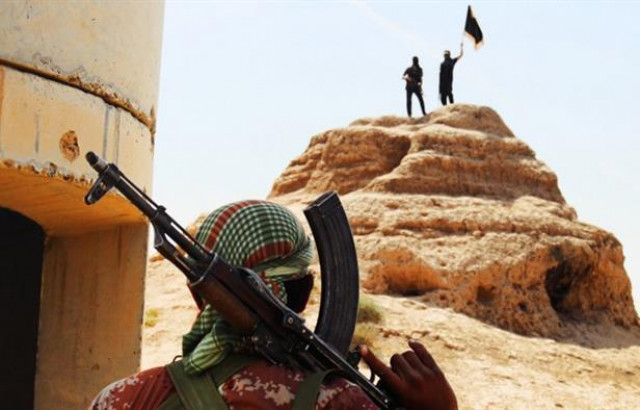Dabiq: The smiling face of Iraq-Syria 'caliphate'
The editorial emphasis in Dabiq, analysts say, is more on state-building than on incitement or operational issues.

Dabiq: The smiling face of Iraq-Syria 'caliphate'
For now, global jihad's latest English-language publishing endeavour is distributed online and the aircraft over Abu Bakr al-Baghdadi's dominion are more likely to be warplanes and drones than commercial jets.
But the 50-page magazine strives to convince its readers that the caliphate proclaimed last month by Baghdadi, leader of the Islamic State (IS) group on an area twice the size of Israel, is the legitimate and viable home of the world's Muslims.
In design, it strongly resembles the Inspire magazine published by al Qaeda's franchise in the Arabian peninsula that disseminated bomb-making instructions and aimed to engender "lone wolf" militants, a goal achieved in 2013 with the Boston bomber brothers.
The editorial emphasis in Dabiq, analysts say, is more on state-building than on incitement or operational issues.
"The aim isn't to get young radicalised Western Muslims to carry out attacks but to come to Syria," said Peter Neumann, director of the London-based International Centre for the Study of Radicalisation.
Many foreign fighters have already taken that step and Richard Barrett, a former counter-terrorism chief at Britain's foreign intelligence agency MI-6, argued Dabiq was mostly a brochure selling the caliphate as a real and credible entity.
"It is the same phenomenon as advertising techniques that aim to endorse your choice of a product rather than inspire it," said Barrett, who now works for The Soufan Group, a New York-based consultancy.
Thousands of foreigners have joined militant groups in Syria since the start of the war there in March 2011 and many of them are now part of the newly-rebranded IS, which has broadened its remit from Iraq into Syria.
Dabiq's first issue also sings the praise of Jordanian-born Abu Musab al-Zarqawi, an ultraviolent military commander who headed IS's early incarnations before being slain in a 2006 US air strike, as a founding figure of the caliphate.
The magazine's introduction explains that it is named after the site of a major 16th century battle in what is now northern Syria that saw the Ottomans defeat the Mamluks and begin a major expansionist phase of an empire Baghdadi and his followers consider to have been the last caliphate.
What the group "wants to communicate by picking this name is that they're following in the Ottomans' footsteps," said Neumann, a professor at King's College London.
Dabiq's first issue, entitled "The Return of Khilafah (caliphate)", includes excerpts from speeches by Baghdadi declaring a new era in Islam and relays his call for skilled professionals the world over to come and help the new state.
Dabiq also features a long and complex theological article essentially justifying the caliphate and Baghdadi's position as both religious and political leader.
According to Barrett, IS "has been good at reaching out to supporters and clearly has design skills, but their written work lacks the pizzaz of Inspire."
Dabiq's editorial team also oddly chose to illustrate the article on "imamah", or leadership, with a free-download stock picture of a border collie herding sheep away from a cliff.
"I guess it shows that it's really made by a Westerner," Neumann said, referring to the fact that dogs are considered impure in Islamic culture and in much of the Arab world.
Inspire and its promotion of "open source jihad" is believed to have been the brainchild of US-born Yemeni cleric Anwar al Awlaki but it is not yet clear who is behind Dabiq.
Barrett predicted that the caliphate's English-language mouthpiece was unlikely to have the same impact and success as Inspire, which became the world's most downloaded extremist publication.
"The main propaganda is still through social media sites such as Facebook, Twitter, Instagram and other more interactive and 'modern' platforms," he said.



















COMMENTS
Comments are moderated and generally will be posted if they are on-topic and not abusive.
For more information, please see our Comments FAQ